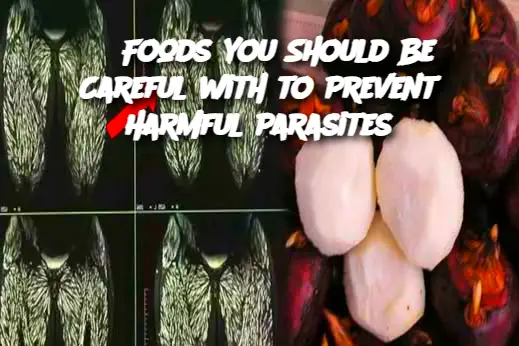Introduction:
Foodborne parasites are a serious concern when it comes to food safety. These tiny organisms, including amoebas, roundworms, hookworms, and tapeworms, can cause a range of health problems once they enter the human body. Symptoms of parasitic infections may include digestive disorders, gastrointestinal infections, anemia, and colitis. While parasites are often undetectable by sight or smell, they can be eliminated through proper hygiene practices and thorough cooking. To protect yourself and your loved ones, it’s essential to be aware of certain foods that can carry harmful parasites. In this article, we’ll discuss the common foods that require extra caution to prevent parasite-related health issues.
Common Foods at Risk for Parasitic Infections:
Undercooked Meat (Pork, Beef, and Fish):
Raw or undercooked meat, particularly pork, beef, and fish, can be a breeding ground for parasites such as tapeworms and roundworms. These parasites can be transmitted when meat is not cooked to the proper internal temperature. For example, undercooked pork can harbor the Trichinella parasite, which causes trichinosis, while fish can carry Anisakis worms, which lead to a condition known as anisakiasis.
Raw or Undercooked Shellfish:
Shellfish, such as oysters, clams, and mussels, are filter feeders that can accumulate parasites from contaminated water. They can harbor trematodes, which are flatworms that can lead to infections in humans. Consuming raw or undercooked shellfish increases the risk of ingesting these harmful parasites.
Unwashed Fruits and Vegetables:
Fresh produce that is not properly washed or peeled can carry parasites such as Toxoplasma gondii, which causes toxoplasmosis, and Giardia, which leads to giardiasis. The soil in which fruits and vegetables are grown can contain these parasites, and improper handling during transportation or at the market can lead to contamination.
Unpasteurized Dairy Products:
Unpasteurized dairy products, such as milk, cheese, and yogurt, can harbor harmful parasites like Cryptosporidium and Giardia. These parasites are resistant to typical cleaning and sanitizing methods, making raw dairy products a potential health risk.
Contaminated Water:
Drinking or using contaminated water for washing food can introduce parasites into your system. Contaminated water sources can carry Giardia, Entamoeba histolytica, and other harmful microorganisms. It’s important to always drink clean, filtered, or boiled water, especially when traveling in areas with poor sanitation.
Instructions for Safe Consumption:
Proper Cooking of Meat:
Ensure that pork is cooked to an internal temperature of 145°F (63°C).
Beef should reach an internal temperature of 160°F (71°C) to kill parasites.
Fish should be cooked to an internal temperature of 145°F (63°C), or until the flesh is opaque and flakes easily with a fork.
Cooking Shellfish Thoroughly:
Shellfish should be cooked at a high temperature to kill parasites. Steaming, boiling, or grilling shellfish ensures thorough cooking. Discard any shellfish that does not open during cooking.
Washing Produce:
Wash fruits and vegetables under running water before eating, cutting, or cooking them. Use a vegetable brush for produce with thicker skins. If possible, peel the outer layers to further reduce the risk of contamination.
Avoiding Raw Dairy Products:
Opt for pasteurized dairy products to ensure they are free of harmful microorganisms. Always check labels when purchasing dairy to confirm it has been pasteurized.
Ensuring Clean Water:
Always drink water from trusted sources, especially when traveling. If you’re unsure about the safety of local water, consider using bottled or filtered water. Boiling water for at least one minute can also help eliminate harmful parasites.
Tips for Serving and Storing:
Storing Meat Properly:
Store raw meat separately from ready-to-eat foods in the refrigerator. Use airtight containers to prevent cross-contamination. Make sure to cook meat thoroughly before serving.
Freezing Fish:
If you’re consuming fish that is raw or lightly cooked, freezing it for at least 24 hours before consumption can kill parasites such as Anisakis.
Wash Hands and Surfaces:
Always wash your hands with soap and water before preparing food and after handling raw meat or seafood. Clean and sanitize surfaces and utensils that come into contact with raw food.
Storage for Produce:
Store unwashed produce in a cool, dry place, but once you’ve washed it, store it in the refrigerator to extend its shelf life. Remember to wash produce just before consumption, not before storage.
Variants to Reduce Risk:
Cooked or Pasteurized Alternatives:
If you enjoy sushi or raw oysters, consider substituting with cooked versions to reduce the risk of parasites. Many restaurants now offer alternatives like cooked sushi rolls or grilled shellfish.
Grow Your Own Produce:
Growing your own fruits and vegetables can help reduce the risk of contamination from unknown sources. If you grow your own produce, make sure to wash it thoroughly before eating or using it in dishes.
the rest on next page
ADVERTISEMENT

